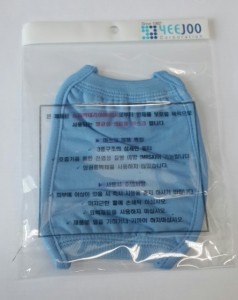
Proto-type anti-super-bacterial masks, made of antibacterial fabric.
A Korean industry-academic collaborative group has recently developed an anti-bacterial fabric that are effective against antibiotic-resistant superbugs ie Staphylococcus aureus strains. Antibiotics have proven to be a valuable weapon in the fight against infectious bacteria. But widespread use of antibiotics has resulted in antibiotic-resistant bacteria . Every year, 0.7 million patients die from a drug-resistant “superbug.” Moreover, nosocomial infections, ie hospital-acquired infections, have become a growing problem.

Consequently, as part of a local public health project, UNIST, Yeejoo Co., Ltd., and Korea Institute of Ceramic Engineering and Technology (KICET) used this anti-bacterial fabric to produce proto-type anti-super-bacterial masks. The group recently donated these masks to Dong Kang General Hospital, a local hospital in Ulsan, South Korea.
This anti-bacterial fabric was developed using a natural bacterial pigment called ‘Violacein’, which is violet pigment naturally made by bacteria found in nature, and is reported to have antibacterial, antiviral, antiprotozoal and anticancer effects. The research team at UNIST, led by Prof. Robert J. Mitchell (School of Life Sciences) extracted crude violacein using a self-developed production method and this was used to dye the cotton fabric. They discovered that this fabric blocked the growth of MRSA and other multi-drug resistant Staphylococcus aureus strains by 99.9%.
http://news.unist.ac.kr/unist-develops-an-anti-bacterial-fabric-using-a-natural-bacterial-pigment/







Recent Comments